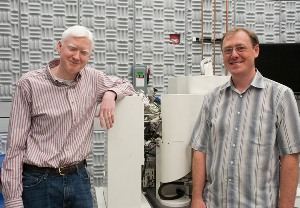In July 2013, 45 blind and visually impaired high school students from around the country gathered at Towson University for a weeklong event designed to expose them to science careers long believed to be impossible for the blind. Twenty of those students participated in an exciting educational program on nanoscale science led by NIST Center for Nanoscale Science and Technology (CNST) Project Leader Vladimir Aksyuk, who has participated in this event for the last three years, and CNST/University of Maryland Postdoctoral Researcher Kevin Twedt, who is visually impaired.
 Physicists Kevin Twedt (left), who is visually impaired, and Vladimir Aksyuk (right) led a two day educational program to introduce a group of blind and visually impaired high school students to nanotechnology.
Physicists Kevin Twedt (left), who is visually impaired, and Vladimir Aksyuk (right) led a two day educational program to introduce a group of blind and visually impaired high school students to nanotechnology.
During six hours of hands-on activities spread over two days, the students learned the basics of size and scale, the metric system, and received an introduction to the nanoscale. They then learned the techniques scientists use to create and measure nanoscale structures. By probing canes against floor models of different shapes and sizes, they were exposed to how an atomic force microscope probe senses topographic changes on a surface. Using plastic models, they explored the structural relationships between carbon atoms forming either planar graphene or three-dimensional carbon nanotubes. Finally, by scanning a laser pointer across black shapes on white paper and using a photodiode with an audio output that got louder in white regions and quieter in dark regions, the students learned how a scanning electron microscope creates images by scanning a beam of electrons across a surface.
“Most of these students had never really considered careers in science or knew that they are possible for blind people,” says Twedt, who has had 20/200 vision since birth. “In a few days, the students gained an appreciation for the work scientists do and perhaps some will consider going into science later on.”
The science, technology, engineering, and math (STEM) program, known as the STEM-X program was sponsored by National Federation of the Blind, under the auspices of its National Center for Blind Youth in Science.